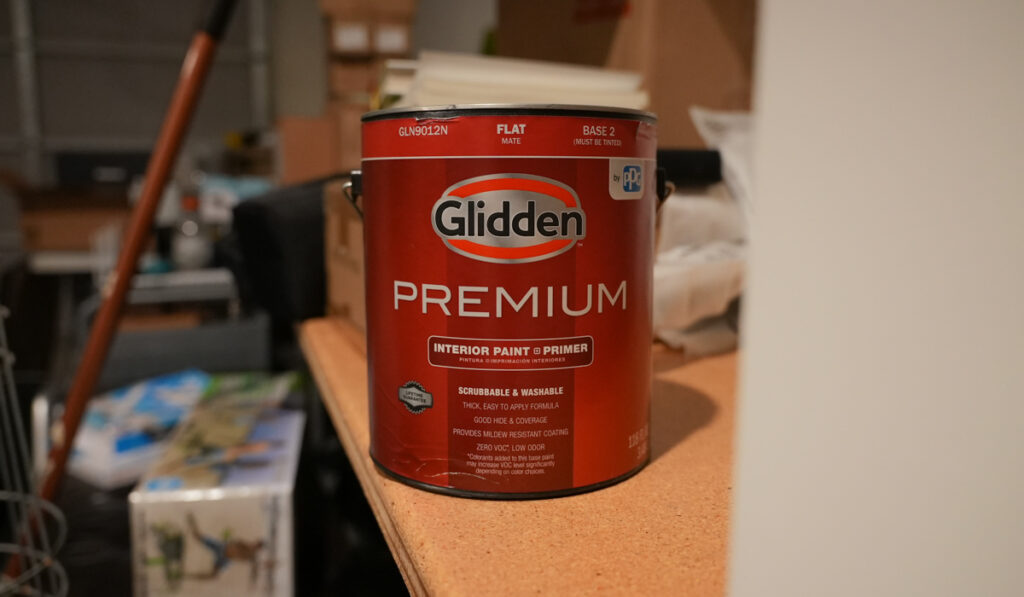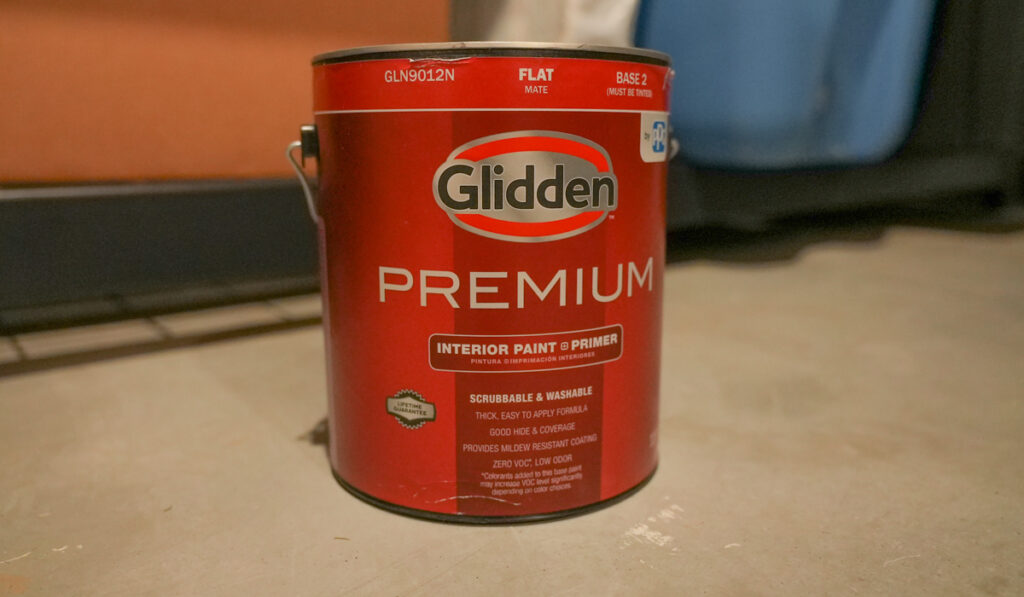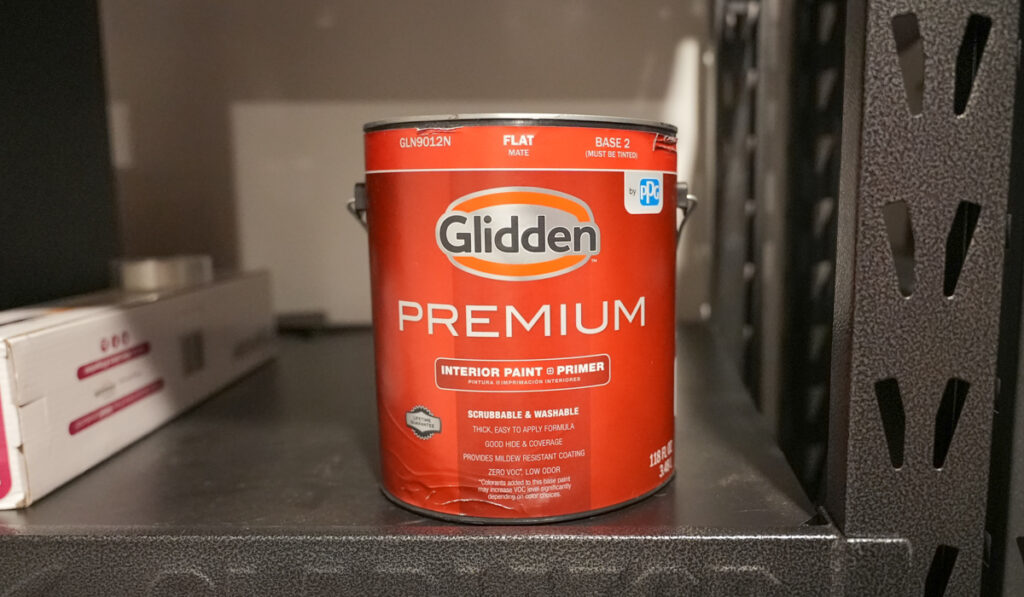Every once in a while, you might choose to repaint one of the rooms in your house. In most instances, you may end up with some paint that has been left over. It may be tempting to dispose of it, but you may need it in the future to retouch some areas. So it would be best if you stored it, but the only available space is in the garage.
It could be safe to store paint in the garage temporarily, but no more than a few weeks. Temperature variations in garages will have an impact on the paint and will cause it to ruin. A more suitable location to store paint is a storage closet where the room temperature is consistent.
Even though keeping paints in a garage is not recommended, we will show you how to do so if you have no other option. We’ll go through what happens to paint when it’s stored in a garage, what types of paint are a little safer to store, and how to tell when your paint has gone bad.
Can You Store Paint In Your Garage?

Yes, but only for a limited time. You will almost always have leftover paint when you finish a painting project. If some areas need to be retouched, you might decide to keep it, even if the only location that comes to mind is your garage.
Keep in mind that most paints will be impacted by severe temperatures and will vary in their consistency. When the consistency of the paint changes, it becomes useless. However, if the paint is stored properly, you can still use it even after five years.
Here are a few things to think about if you decide to keep your paint in the garage.
1). Keep in airtight containers
Keep any leftover paint in sealed containers. Airtight containers keep air out of your paint, making it impossible to dry faster. If your original paint container is broken, you’ll need to replace it or hunt for sealed jars.
Another thing to remember is that the container’s borders should be free of paint. When the paint along the edge of the container dries, it will be hard to open it.
2.) Label your paint containers properly
Label your leftover paint containers to make your job easier. You can use the names of the rooms that you painted to name them. This labeling method eliminates the need to open a paint can to confirm its contents when you need it.
Make sure the color code and number are visible on the paint container. If you changed the paint in any manner, make a note of it. All of this will come in handy if you ever need to add more paint of the same hue.
3. Be keen on the room temperature
The room temperature for the garage will also determine whether it is the ideal place to store your paint. Room temperature will always be the best temperature to store your paint.
If your garage isn’t heated in the winter, don’t store water-based paints there. Temperatures have a strong impact on water-based paints. If you have oil-based paints, you can store them for a few days. Oil-based paints are not easily affected by temperature.
What Will Happen To Paint Stored In The Garage?

The garage may be the sole place with extra storage space for your paint. Though it may be difficult to make this decision, you should know what can happen to your paint if stored in the garage.
When the temperature is not ideal;
Temperatures below 35 degrees are not ideal for your paint since it will freeze, especially water-based. You should expect lumps in your paint when it freezes, especially if it’s latex-based.
The length of time the paint has been frozen will influence whether you may use it. You’ll also need to evaluate the paint’s nature and whether or not it froze.
Extreme heat will also not be good for your paint. The consistency of your paint will be affected and may no longer have that glossy shine. If the paints you have stored are water-based, it may be very hard to reverse their pigments if affected by extreme heat.
Oil-based paints produce a skin-like layer on top as they dry and their pigment settles. The paint will eventually dry out slowly over time. Oil-based paints have the potential to burn when exposed to extremely high temperatures.
The paint can become unsuitable due to the two sorts of temperatures listed above, and it will need to be disposed of in most cases.
Is It Safe To Store Certain Types of Paint In The Garage?

Paints should not be stored in a garage, according to standard advice. On the other hand, some paint varieties would last a little longer. Water-based paints don’t do well in garages because they seem to be the most susceptible to severe temperatures.
Latex-based paints perform slightly better but solidify into a rubbery mass in severe temperatures. Acrylic and oil-based paints are the best choices for storing in a garage.
If you keep acrylic and oil-based paints in sealed containers, they will last a little longer. Please keep them in a cool, dry location. It is preferable to place the containers on a shelf not to touch the water.
How Do You Know If Your Paint That Was Store
You’ve had your paint in the garage for a while and are wondering if you can use it again. You can use various techniques to determine whether your paint has gone bad or can still be used.
- Paint it on a surface: When you paint on a surface, and the paint becomes rough and bumpy, it’s time to throw it away. If the stored paint has gone bad, the sheen will be drab, and the surface will no longer be smooth.
- Use a stir stick: Most interior paints will come with a stir stick for stirring. Use it to stir your old paint. If the paint refuses to mix up, then it has spoilt.
- Has a bad smell: If your paint has gone bad, it will have a very bad smell. Bacteria and mold in the paint will have a bad odor or a sour smell. Should you decide to use the paint, the part you will have used it on will smell. You must note that if the paint smells like chemicals, it has not gone bad. You can still use it.
Conclusion
It’s not a bad idea to keep your paint in the garage. However, you must make a well-informed selection. While it is not recommended to store paints in the garage, we hope you will use the recommendations provided to ensure that your paints are still useful after some time.
